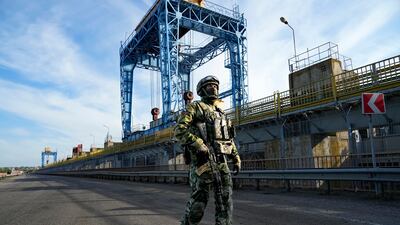Ukraine has dealt a significant blow to Russia by blowing up a critical rail line, UK military intelligence has said.
The rail link connecting Russian-occupied Kherson in southern Ukraine with Crimea is highly unlikely to be working after a Ukrainian strike against a Russian ammunition train, Britain said on Wednesday.
Russian forces are likely to repair the railway line in a few days, although it will remain a vulnerability for Russian forces and their logistical resupply route from Crimea into Kherson, according to the intelligence update on Twitter.
It said Russia has publicised the ferry crossing recently established to replace the damaged Antonovsky Bridge over the Dnipro river in Kherson as being for civilian use. However, the Russian military will almost certainly use it for troop movements and logistical resupply.
It is likely there will be an increase in civilians attempting to flee Kherson and surrounding areas, as hostilities continue and food shortages worsen, according to the update.
Meanwhile, Russia on Wednesday said it had destroyed a depot of foreign arms near the city of Lviv, in a rare strike on western Ukraine.
"Air-launched high-precision long-range missiles near the city of Radekhiv in Lviv region destroyed a storage base with foreign-made weapons and ammunition delivered to the Kyiv regime from Poland," the defence ministry said in a statement.
The statement did not specify what types of weapons were destroyed in the attack on Radekhiv, some 60 kilometres (37 miles) northeast of the regional capital Lviv.
The ministry said it also destroyed four warehouses containing rockets, artillery weapons and ammunition in the southern region of Mykolaiv and the eastern region of Donetsk.
President Vladimir Putin sent troops into Ukraine on February 24, sparking a conflict that has killed thousands, displaced millions and fuelled fears of a global food crisis over blocked grain exports.
After abandoning efforts to take Ukraine's capital Kyiv, Russian troops have instead focussed on capturing the eastern region of Donbas.
In recent weeks the Ukrainian army, bolstered by deliveries of Western-supplied long-range artillery, has sought to stage a counter-offensive to retake the southern region of Kherson.
Ukrainian President Volodymyr Zelenskyy said on Tuesday that despite arms supplies from the West, his country's forces could not yet overcome Russian advantages in heavy guns and manpower.
“This is very much felt in combat, especially in the Donbas,” he added. “It is just hell there. Words cannot describe it.”

Russia has accused the US of direct involvement in the Ukraine war.
Russia's Defence Ministry, headed by an ally of President Vladimir Putin, said comments made by Vadym Skibitsky, Ukraine's deputy head of military intelligence, to Britain's Telegraph newspaper showed that Washington was entangled in the conflict despite assertions it was limiting its role to arms supplies.
Mr Skibitsky told the paper there was consultation between US and Ukrainian intelligence officials before strikes and Washington had an effective veto on intended targets, but that US officials were not providing direct targeting information.
“All this undeniably proves that Washington, contrary to White House and Pentagon claims, is directly involved in the conflict in Ukraine,” the Russian defence ministry said in a statement on Tuesday.
“It is the Biden administration that is directly responsible for all Kyiv-approved rocket attacks on residential areas and civilian infrastructure in populated areas of Donbas and other regions, which have resulted in mass deaths of civilians.”


